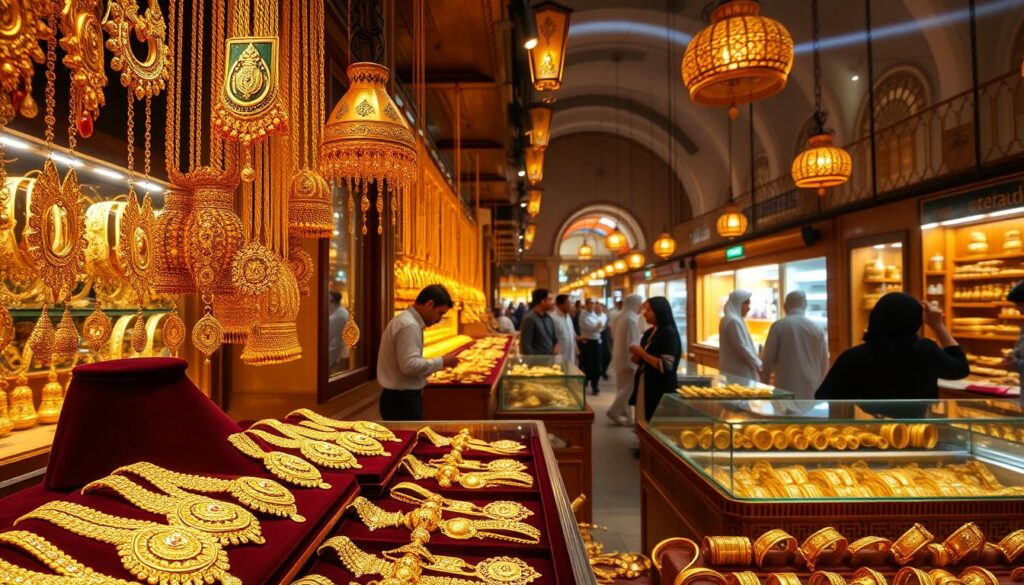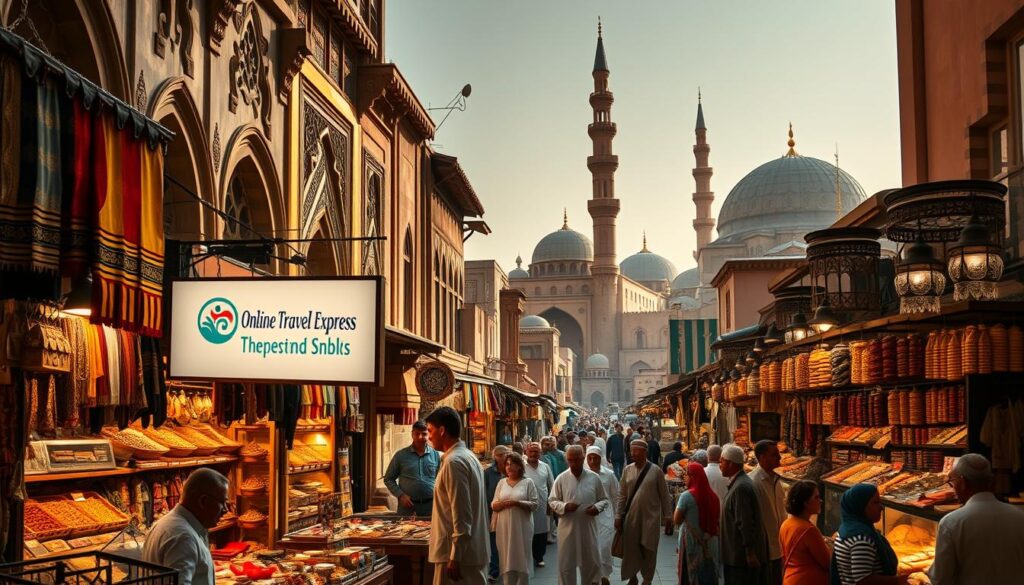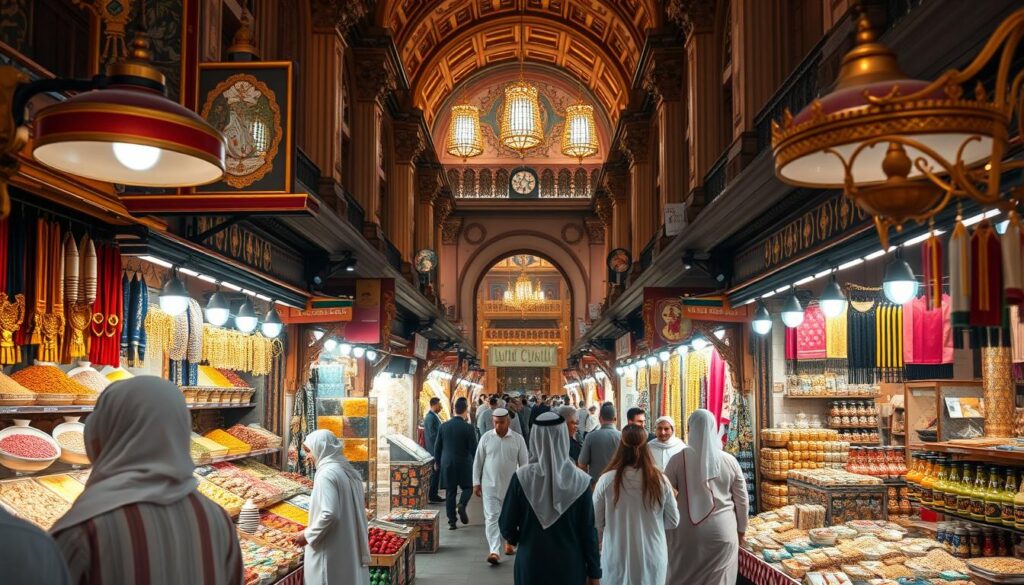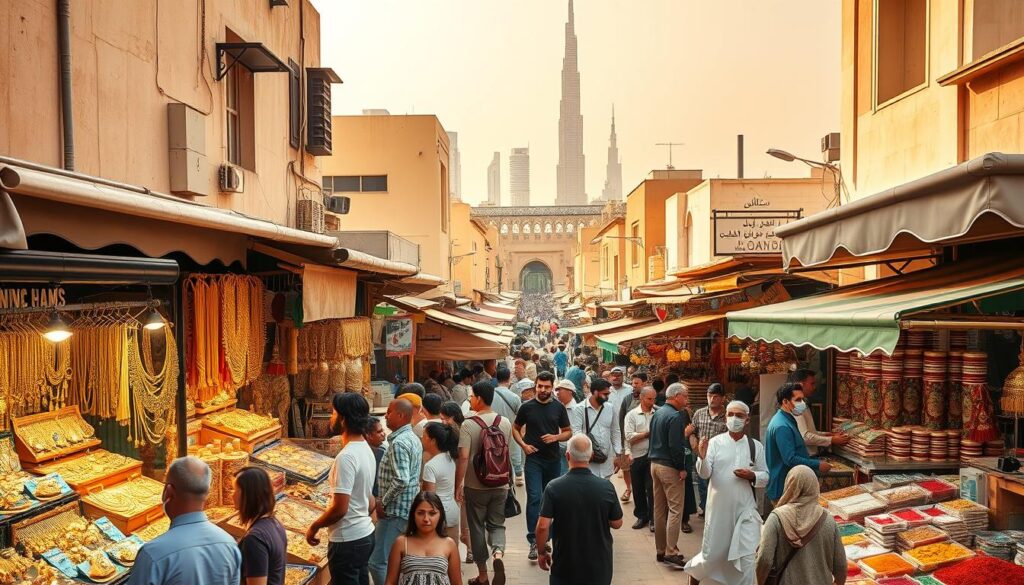Did you know Dubai’s traditional souks handle over $1.5 billion in trade each year? These markets are more than places to shop. They are living museums of culture and commerce that have shaped the UAE for centuries.
Visiting Dubai’s traditional souks in gold, spice, and textiles is an immersive experience. Each market has its own story, showing you the old trading traditions that still live on in Dubai today.
These markets offer a real look into Dubai’s rich culture. You can see everything from shiny gold jewelry to fragrant spices and beautiful textiles. Whether you’re a seasoned traveler or new to Dubai, the souks will amaze you and take you back in time.
Key Takeaways
- Discover authentic cultural experiences in Dubai’s traditional markets
- Explore diverse trading heritage across multiple souk specialties
- Learn unique bargaining techniques from local merchants
- Understand the economic significance of Dubai’s marketplaces
- Experience sensory-rich shopping environments
Introduction to Dubai’s Traditional Souks
Dubai’s souk market is a vibrant peek into Arabian commerce’s heart. Walking through these markets, you’ll find history, culture, and trade blending beautifully. The Dubai souk shopping guide takes you on a journey through time.
Souks are more than just markets in Dubai. They are living museums of Emirati heritage. Each stall has its own story, and every transaction connects you to ancient trading traditions.
What Are Souks?
Souks are traditional Middle Eastern markets that are the heart of local commerce. In Dubai, they offer a unique shopping experience. You’ll find markets for different products, like:
- Gold Souks with precious jewelry
- Spice Souks with aromatic herbs and seasonings
- Textile Souks with vibrant fabrics
- Perfume Souks with exotic fragrances
The Importance of Souks in Emirati Culture
The souk market Dubai is more than a place to shop. It’s a cultural institution that keeps traditional trading alive. It connects generations and preserves Dubai’s rich history.
For both travelers and locals, souks offer an immersive experience. They show the true spirit of Arabian hospitality and entrepreneurship. Whether you’re looking for unique souvenirs or want to explore authentic culture, Dubai’s souks are a journey through time and tradition.
The Gold Souk: A Shimmering Experience
Dubai’s gold market is a stunning place for those who love jewelry and investing. Located in Deira, the Gold Souk is a world of precious metals. It draws thousands every year with its wide range of gold jewelry.

Looking to buy gold in Dubai? The Gold Souk is the top spot. It has a huge area filled with shops. Each one shows off beautiful gold pieces, from traditional to modern designs.
Popular Jewelry Types to Explore
There’s a lot to see when you go gold shopping:
- 24-karat gold bangles and bracelets
- Delicate Arabic-inspired necklaces
- Elegant engagement rings
- Traditional Emirati gold pendants
- Customized gold accessories
Tips for Bargaining in the Gold Souk
Shopping for gold in Dubai needs some smart strategies. Here are some tips for bargaining:
- Research current gold prices before visiting
- Compare prices across multiple shops
- Negotiate respectfully and confidently
- Ask about weight and purity certification
- Request a detailed receipt for your purchase
Pro tip: The best time to visit the Gold Souk is during weekday mornings when shops are less crowded, allowing for more personalized interactions.
Savoring the Spice Souk: A Feast for the Senses
Step into the vibrant Dubai spice market. Here, aromas dance through narrow alleys and colors burst from every corner. The best souks in Dubai offer an immersive sensory journey. It will transport you deep into the heart of Middle Eastern culinary traditions.
Visiting the Spice Souk is like entering a living museum of flavors. The marketplace buzzes with energy. It displays an incredible array of spices that tell stories of ancient trade routes and cultural exchanges.
What to Expect at the Spice Souk
You’ll encounter a kaleidoscope of sensory experiences in this remarkable marketplace:
- Vibrant displays of spices in massive burlap sacks
- Merchants eager to share their knowledge about local ingredients
- Aromatic blends that showcase Dubai’s rich culinary heritage
- Opportunities to sample fresh spices before purchasing
Essential Spices to Look For
When exploring the Dubai spice market, keep an eye out for these special ingredients:
- Saffron: The world’s most expensive spice
- Cardamom: A staple in Arabic coffee and desserts
- Sumac: A tangy, red spice used in many Middle Eastern dishes
- Za’atar: A beloved herb blend with multiple culinary uses
How to Choose Quality Spices
To ensure you’re getting the best souks in Dubai have to offer, follow these expert tips:
- Check for vibrant colors and strong aromas
- Ask vendors about the spice’s origin
- Purchase small quantities to maintain freshness
- Observe how merchants store and handle their products
Your spice souk adventure promises to be an unforgettable exploration of flavors, traditions, and sensory delights. Prepare to be amazed by the rich culinary landscape of Dubai.
The Textile Souk: Weaving Traditions
Dubai’s textile market is a colorful mix of old traditions and new fashion. The traditional souks in Dubai let you dive into the world of fabrics and design. It shows the skill of Emirati craftsmanship.
At the Textile Souk, you’ll see a world of colors, textures, and patterns. These tell stories of generations of skilled artisans. The market is alive with energy, showing textiles from the Middle East and more.
Exploring the Textile Souk Layout
The souk has narrow alleys with vibrant fabric shops. Each part offers a unique textile experience:
- Ground floor: Cotton and lightweight fabrics
- Upper levels: Silk and premium materials
- Specialty corners: Traditional Emirati textile designs
Fabrics That Define Emirati Fashion
Emirati fashion is known for its unique fabrics. The Dubai textile market has amazing materials:
| Fabric Type | Traditional Use | Characteristics |
|---|---|---|
| Kandura Cotton | Men’s Traditional Wear | Lightweight, Breathable |
| Silk Chiffon | Women’s Elegant Wear | Delicate, Flowing Texture |
| Wool Blend | Winter Garments | Warm, Durable |
Custom Tailoring Options Available
Visiting the Textile Souk means trying its bespoke tailoring services. Skilled artisans can make clothes that show your style and respect tradition.
“In every thread, we weave a story of our culture and craftsmanship.” – Local Textile Artisan
Looking for a custom abaya, a fitted kandura, or unique accessories? The Textile Souk offers a memorable shopping experience. It connects you with Dubai’s rich textile traditions.
Navigating Your Way Through the Souks
Exploring Dubai souks is an exciting adventure for those seeking a real shopping experience. Your Dubai souk shopping guide will help you enjoy your visit to these lively markets.
Planning your souk trip needs thought about timing, transport, and safety. Dubai souks give a peek into local culture. But, navigating them well requires some planning.
Best Times to Visit the Souks
Timing is key when visiting Dubai souks. The best times for shopping are:
- Early morning (8-10 AM) to avoid the heat
- Late afternoon (4-6 PM) when it’s cooler
- Winter months (November-February) for better weather
- Weekdays for fewer crowds
Transportation Options
Getting to the souks is easy with many transport options:
- Dubai Metro: Closest to traditional souks
- Water taxi (abra) for a scenic ride
- Taxi services are always available
- Organized tour buses
Safety Tips for Tourists
“Prepare, stay aware, and enjoy the experience!” – Local Dubai Travel Guide
Your Dubai souk shopping guide suggests these safety tips:
- Keep valuables safe
- Carry only what cash you need
- Dress with respect
- Drink plenty of water
- Use official currency exchange services
By following these tips, you’ll have a safe and memorable trip through Dubai’s amazing markets.
Historical Significance of Dubai’s Souks
Dubai’s souk market has grown from a small trading post to a bustling economic center. The traditional souks in Dubai are more than just markets. They are living museums of cultural exchange and economic innovation.

The story of Dubai’s trading landscape is truly remarkable. It has changed from pearl diving and coastal trading to becoming a global commercial hub. The traditional souks in Dubai have seen an incredible economic transformation.
The Evolution of Trade in Dubai
Dubai’s economic growth can be seen through its souk markets. The key milestones include:
- Pearl trading in the early 20th century
- Spice route connections with global merchants
- Emergence of gold trading as a primary economic driver
- Transition from local markets to international trading platforms
Iconic Structures and Architecture of the Souks
The architecture of Dubai’s souks shows a rich heritage. Wind towers, known as barjeels, and traditional coral stone buildings showcase the genius of early traders.
These structures provided cooling solutions and showed the architectural brilliance of early Dubai traders. The souk market Dubai keeps these architectural gems alive. They offer visitors a look into the city’s remarkable trading history.
Local Cuisine Around the Souks
Exploring Dubai’s souks is as exciting as the shopping itself. The markets around offer a wide range of flavors. These will make your taste buds dance and give you a true taste of Emirati cuisine.
Your guide to Dubai souk shopping isn’t complete without trying the local street food and restaurants. The area around the souks is a feast for the senses. It shows the diverse cultural influences of the region.
Must-Try Dishes Near the Souks
- Machboos – A traditional rice dish with tender meat
- Luqaimat – Sweet dumplings drizzled with date syrup
- Arabic grilled meats and kebabs
- Fresh seafood from local restaurants
Popular Street Food to Sample
As you explore the vibrant markets of Dubai, try these street food favorites:
| Street Food | Description | Price Range |
|---|---|---|
| Shawarma | Grilled meat wrap with fresh vegetables | 5-10 AED |
| Falafel | Crispy chickpea fritters | 3-7 AED |
| Manakish | Arabic flatbread with various toppings | 8-15 AED |
Your journey around Dubai’s souks is a flavorful adventure. Each bite is a story of tradition, spice, and culture. It’s a journey you won’t forget.
Souk Etiquette: Do’s and Don’ts
Exploring Dubai souks means knowing local customs. When you visit the souk market Dubai, being respectful is key. It makes your experience better and more meaningful.

Shopping in Dubai souks is more than just buying things. You must also respect local customs and social norms. These traditions shape how people interact in these historic places.
Respecting Local Customs
Being culturally aware is important in Dubai’s traditional markets. Here are some important tips:
- Greet shopkeepers with As-salaam-alaikum (peace be upon you)
- Ask permission before taking photos of people
- Use your right hand for transactions and exchanges
- Maintain a respectful distance during conversations
Dress Code Guidelines
Your clothes show respect in the souk market Dubai. Dress modestly to respect local customs:
- Wear clothing that covers shoulders and knees
- Avoid tight or revealing clothing
- Women might consider carrying a light scarf for additional coverage
- Choose breathable, lightweight fabrics suitable for warm temperatures
“Respect is the passport to authentic cultural experiences in Dubai’s souks.”
By following these etiquette tips, you’ll make lasting connections. You’ll also enjoy a deep and respectful exploration of Dubai’s amazing traditional markets.
Artisans and Craftsmen in the Souks
Dubai’s traditional souks are more than markets. They are museums of craftsmanship and culture. Exploring Dubai’s souks, you’ll find incredible artisans. They keep alive techniques passed down for centuries.
The souks of Dubai offer a peek into the world of local craftspeople. Each artisan adds authenticity and depth to your shopping experience. They are a key part of Dubai’s traditional souks.
Supporting Local Artisans
Visiting Dubai’s markets lets you support local craftsmen. Your purchases help keep traditional skills alive and support local communities. Look for artisans who:
- Make handmade textiles using old weaving techniques
- Create intricate metalwork and jewelry
- Practice traditional Arabic calligraphy
- Make hand-carved wooden items
Unique Crafts to Purchase
Dubai’s souks have remarkable handcrafted items perfect for souvenirs. Here are some unique crafts that show the region’s artistic heritage:
- Hand-woven Bedouin textiles with intricate patterns
- Traditional Arabic coffee pots (dallah)
- Handmade Arabian perfume bottles
- Customized Arabic calligraphy artwork
By supporting local artisans, you’ll get a special memento. You’ll also help keep Dubai’s rich cultural traditions alive.
Weekend Markets and Events
Your Dubai souk shopping guide wouldn’t be complete without exploring the vibrant weekend markets and special events. These events bring the traditional marketplaces to life. Dubai souks transform during seasonal celebrations, offering visitors an immersive cultural experience.

The weekend markets in Dubai create unique opportunities to experience local traditions and artisan crafts. These special events showcase the rich cultural heritage of the Emirates. They offer engaging activities and spectacular displays.
Special Events at the Souks
Throughout the year, Dubai’s souks host remarkable events that attract both locals and tourists. Some notable experiences include:
- Annual Heritage Festival showcasing traditional crafts
- Ramadan Night Markets with extended evening shopping
- Local artisan exhibitions featuring handmade products
- Cultural performance stages with traditional music and dance
Festivals Celebrating Local Traditions
Visitors can immerse themselves in authentic Emirati culture through festivals that highlight local customs. These events often feature:
- Traditional textile demonstrations
- Spice and culinary workshops
- Live handicraft creation sessions
- Traditional costume displays
When planning your Dubai souk shopping adventure, check local event calendars. Align your visit with these exciting cultural celebrations. Each festival offers a unique glimpse into the rich tapestry of Emirati heritage.
Conclusion: Your Souk Adventure in Dubai
Dubai’s traditional souks are a journey into cultural heritage and lively markets. Exploring gold, spice, and textile markets gives you a peek into the city’s trading past. These souks are more than places to shop; they offer a deep dive into local traditions and craftsmanship.
When you visit souks, be curious and respectful. The gold souk shines with beautiful jewelry, the spice souk smells amazing, and the textile souk displays stunning fabrics. Talk to vendors, bargain gently, and enjoy the sights and smells that make these places special.
Final Tips for an Enriching Experience
Get ready for your souk adventure by wearing comfy shoes, carrying cash, and bringing a water bottle. Visit early morning or late afternoon for better weather and fewer crowds. Chat with vendors, learn about their work, and take photos to remember your trip.
Making the Most of Your Visit
Your souk visit is a cultural journey through Dubai’s history. By following local customs, admiring the craftsmanship, and being open to new things, you’ll make memories that last. Let the souks show you Dubai’s lively trading spirit.

